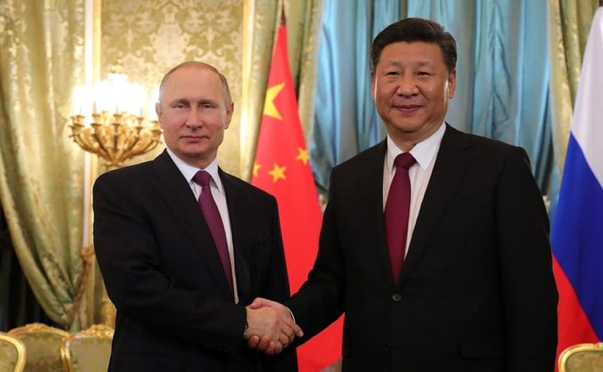
Xi, Putin hold first in-person meeting after Russian invasion of Ukraine

Chinese President Xi Jinping and his Russian counterpart Vladimir Putin met in Samarkhand, Uzbekistan, on Thursday (September 15) on the sidelines of the SCO summit – their first in-person meeting after Russia launched the war against Ukraine in February – and declared support for their “respective core interests.”
“In the face of the colossal changes of our time on a global scale, unprecedented in recent history, we are ready to team up with our Russian colleagues to set an example of a responsible world power and to play a leading role in putting a rapidly changing world on the track of sustainable and positive development,” Xi told Putin ahead of the Shanghai Cooperation Organisation summit in the Uzbek city.
“China is ready to work with Russia in extending strong support to each other on issues concerning their respective core interests,” President Xi said during his meeting with President Putin, Chinese state-run Xinhua news agency reported.
Also read: Saudi Arabia overtakes Russia to be No.2 supplier of oil to India
Moscow’s backing to ‘One-China’ policy
Beijing is ready to play a leading role together with Moscow to put the changing world on a sustainable development track, state-owned Russian news agency TASS quoted Xi as saying during the meeting.
The Chinese leader stressed that he was ready to exchange views with his Russian counterpart on the bilateral agenda, as well as on international and regional issues of mutual interest.
For his part, Putin extended Moscow’s firm backing to Beijing’s “One-China” policy which proclaims that the self-governing island Taiwan is part of mainland China, in the backdrop of the US increasing backing to Taipei.
US House speaker Nancy Pelosi visited Taiwan recently, becoming the top American leader to visit the island nation, which prompted China to conduct massive military drills around the island.
Also read: UN chief and Putin discuss war in Ukraine
Russia firmly adheres to the One-China principle and condemns US provocations in Taiwan, President Putin said.
“Firmly indeed, we adhere to the one-China principle. We condemn the provocations of the United States and its satellites in the Taiwan Strait, the Russian leader stressed.
What’s on agenda?
The reunification of Taiwan with the mainland is one of the core issues for China.
Putin added that he had also recently discussed this with Li Zhanshu, chairman of the Standing Committee of the National Peoples Congress (parliament), with whom he met on the sidelines of the Eastern Economic Forum in Vladivostok, Tass reported.
Neither side has released an official agenda of the meeting but the Kremlin said on Wednesday (September 14) that the leaders were expected to discuss the war in Ukraine and issues involving Taiwan.
Xi made his first visit after over two years to Kazakhstan on Wednesday and later he flew to Samarkand on the same day to attend the eight-nation SCO summit.
Also read: Ukraine’s military claims downing Iran drone used by Russia
Before meeting Putin, he met most of the Heads of State of the Central Asian countries who are attending the summit.
Close personal relations
Launched in Shanghai in June 2001, the SCO has eight full members, including its six founding members, China, Kazakhstan, Kyrgyzstan, Russia, Tajikistan and Uzbekistan. India and Pakistan joined as full members in 2017.
Coinciding with the Xi-Putin meeting, the Russian defence ministry said on Thursday that the two countries’ navies were conducting joint patrols in the Pacific.
Xi and Putin maintained close personal relations during the 10-year tenure of the Chinese leader and Beijing effectively stood by Moscow declining to condemn the Russian invasion of Ukraine, even though it officially asserts that it maintains a neutral stance on the Ukraine issue.
Tass earlier reported that Putin and Xi will discuss in Samarkand the bilateral agenda with an emphasis on economic cooperation, as well as regional and international issues.
Putins aide Yury Ushakov said the talks would have special importance given the situation in the world.
According to Ushakov, this meeting is a “long-awaited personal contact,” the second one over the period of the coronavirus pandemic.
Also read: Taiwan says China’s ‘war games’ sign of imminent invasion; stages military drills
Their last meeting was when Putin attended the opening ceremony of the Olympic Winter Games in February, days before Russia attacked Ukraine.
The most recent phone call of the Russian and Chinese leaders was in June, when they discussed a wide range of issues, including the development of military and military-technical ties, an expansion of cooperation on the energy, financial and industrial tracks amid the anti-Russian sanctions imposed by the West, Ushakov said.
The two leaders pointed out in general that Moscow and Beijing saw eye-to-eye or had close positions on the world stage, the Tass report said.
Ushakov said China drew a “balanced approach” to the Ukrainian crisis, noting that Beijing “states explicitly that it understands the reasons that forced Russia to launch a special military operation against Ukraine.
China’s support for Russia
Putin and Xi Jinping will also discuss the activities of the SCO and a growing role of the organisation in international affairs. No joint documents are expected to be signed following the meeting.
Ahead of the Xi-Putin meet, China’s top legislator Li Zhanshu said that China fully supported Russia on issues of the country’s “core interest” raising eyebrows.
“On Russia’s core issues or issues of great interest, China expresses full understanding and full support,” he told Russian State Duma Chairman Vyacheslav Volodin.
Also read: China continues unprecedented military drills around Taiwan even after end of four-day schedule
“Just like the Ukraine issue now, the United States and NATO had pushed straight to Russia’s doorsteps. This involves Russia’s national security and the safety of its people’s lives. In light of this, China understands that Russia needs to do what is appropriate and is giving coordinated support on multiple fronts,” Li was quoted as saying.
(With agency inputs)

